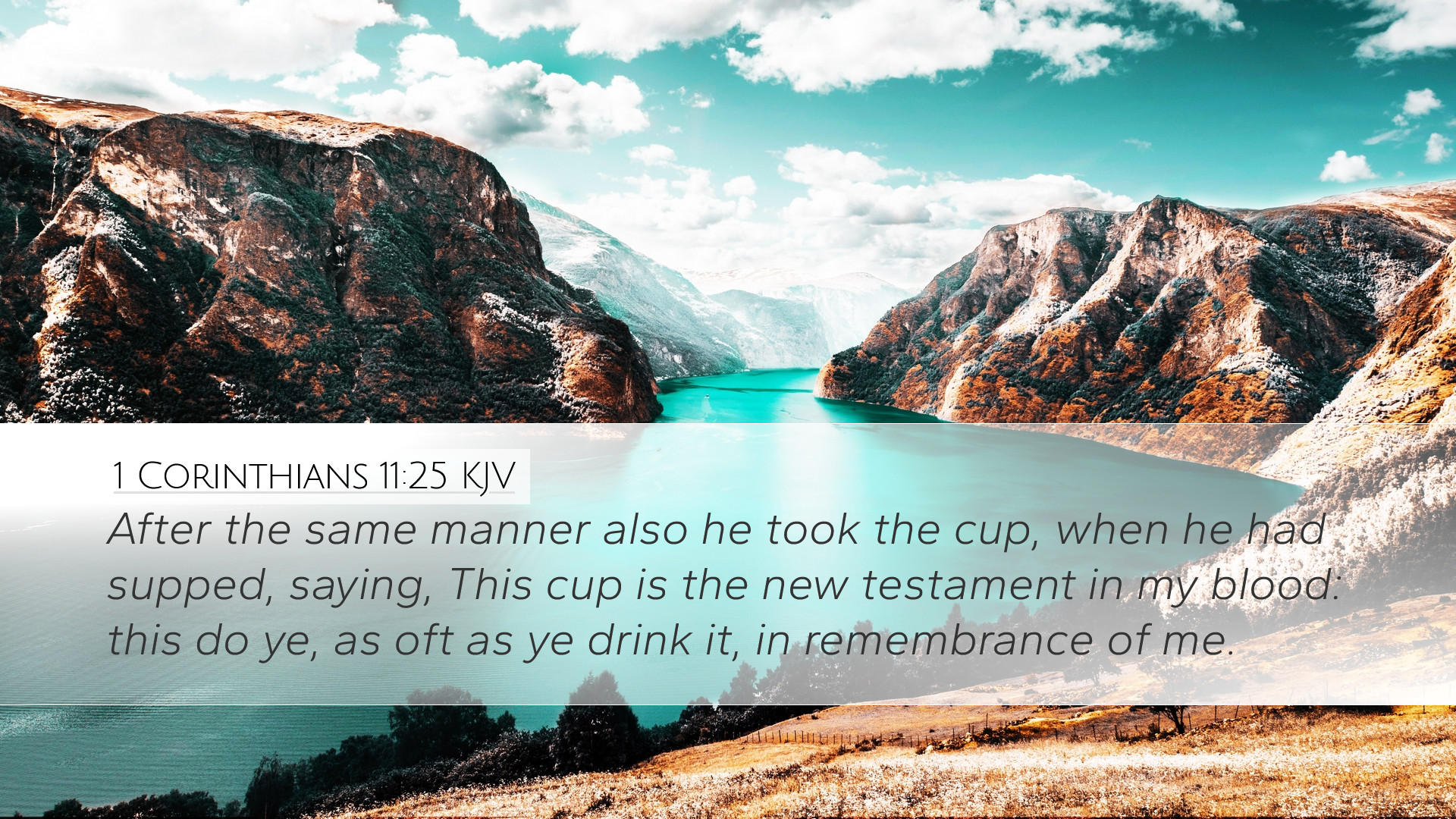Commentary on 1 Corinthians 11:25
Verse Text: "In the same way, after supper he took the cup, saying, 'This cup is the new covenant in my blood; do this, whenever you drink it, in remembrance of me.'" (1 Corinthians 11:25)
Introduction
This pivotal verse within the Apostle Paul's discourse regarding the Lord's Supper encapsulates profound theological themes relating to covenant, sacrifice, and remembrance. Paul refers back to the Last Supper, emphasizing Jesus' establishment of a new covenant through His shed blood, inviting deep reflection on its implications for Christian faith and practice.
The Significance of the Cup
Albert Barnes emphasizes that the cup serves as a emblem of the blood of Christ, which is integral to the new covenant. The shedding of His blood signifies the cost of redemption and the establishment of a new relationship between God and humanity. Believers are called to reflect on the profound meaning of this sacrifice, recognizing that it represents the ultimate payment for sin and the means of reconciliation with God.
Matthew Henry expands upon this by underscoring that the act of partaking in the cup is a proclamation of faith. When believers drink from the cup, they openly declare their reliance on the blood of Christ for salvation and their commitment to the covenant community. It serves as both a personal affirmation and a communal remembrance of Christ's sacrifice, reinforcing the bonds of unity among Christians.
The New Covenant
Adam Clarke elucidates that the term "new covenant" signifies a marked transition from the old covenant, established through the Law, to one characterized by grace and faith through Jesus Christ. This new covenant is rooted in promises of forgiveness and transformation, granting believers access to God. In referencing Jeremiah 31:31-34, Paul aligns the establishment of this covenant with Old Testament prophecy, enhancing its legitimacy and significance for the early church.
Moreover, Henry notes that the new covenant is not merely an abstract legal agreement; it encompasses a relational dynamic wherein God promises to be our God and we are to be His people. This covenantal promise entails an internal transformation where the laws of God are written on the hearts of believers, thus enabling them to live in accordance with His will.
The Act of Remembrance
In highlighting the phrase "do this, whenever you drink it, in remembrance of me," Barnes emphasizes the importance of remembrance in the life of a believer. This call to remembrance is not a mere mental acknowledgment; rather, it is an active engagement with the reality of Christ's death and its implications for personal faith. The act of remembrance is intended to foster gratitude, repentance, and a renewed commitment to living out the implications of the gospel.
Clarke further elaborates by asserting that the remembrance serves as a safeguard against spiritual apathy. When believers partake of the cup, they are reminded not only of Christ's sacrifice but also of their own calling to follow Him in obedience and service. This act infuses their ordinary routines with extraordinary significance as they recognize the ongoing relevance of Christ's work in their lives.
Conclusion
1 Corinthians 11:25 encapsulates rich theological insights for both personal faith and community practice. As believers reflect on the new covenant established by Jesus through His blood, they are called to participate in the Lord's Supper with a heart of remembrance—a remembrance that acknowledges both the grace given and the responsibility it entails. Ultimately, this passage compels Christians to live in the light of the gospel, continually orienting their lives around the sacrificial love of Christ.
As pastors, students, and theologians delve into this verse, may they find themselves enriched in understanding and renewed in their commitment to proclaiming the message encapsulated within this covenant and its implications for the community of faith.


